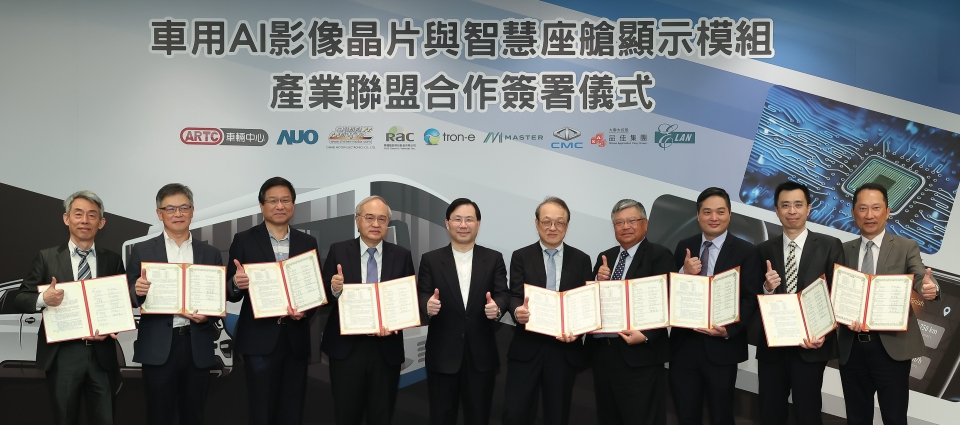ARTC and Automotive Electronic Industry Reps Ink AI Imagery Chip and Smart Cockpit Alliance
2022/03/18 | By Tingyu Chao
Top automotive electronic suppliers and Taiwan's leading R&D center in autonomous technology and testing, Automotive Research and Testing Center (ARTC), collectively announced the formation of the “Automotive AI Imagery Chip and Smart Cockpit Display Module Industry Alliance" on March 18.
Representatives from Elan Microelectronics, AU Optronics, Chimei Motor, China Motor, RAC Electric Vehicles, Master Transportation Bus, Tron-e, WPG Holdings' Silicon Application Corp, and ARTC inked an MOU at the signing ceremony in recognition of this alliance. The alliance aims to aggregate the entire production chain, from upstream to downstream suppliers, and ensure Taiwan has the ability to indigenously design automotive IC display technologies and develop independently designed automotive AI imagery and Mini LED display computing chip modules.
The idea is to combine these capabilities with free-form display technologies, independently develop the smart cockpit industry with relevant technologies, and roll out automotive imagery sensor chips that adhere to global standards for ADAS modules and systems. For the next stage, wider-scale application, the alliance will aim to meet the EV Bus and EV Car requirements for smart cockpits, further integrating everything with AI sensor technology inside and outside the cockpit. The overall goal is to ensure Taiwan has the key technologies to develop smart vehicles domestically and upgrade the industry's value.
Automotive Electronics Market Sees Hot Demand
According to the global industry survey organization MarkLines’statistics, electric vehicles will eventually make up over 80% of all vehicles on the road in the future. There is significant momentum behind the EV growth in Taiwan; in the past five years, the automotive electronics industry value has quickly grown by 13% each year. In 2021, industry value reached NTD$300 billion, and that figure is expected to increase as more and more ICT brands are investing in the industry. MarkLines expect Taiwan's industry value to hit NTD$600 billion by 2025.
MarketWatch statistics also signify explosive growth for the future, with estimates showing that the global imagery chip market value will reach USD$5.7 billion by 2027. For automotive display chip applications and rearview, smart cockpit markets, the market scale is forecasted to reach USD$50.4 billion.
The reality is that domestic suppliers are increasingly investing in developing automotive chips, ADAS system development, and free-form display panels. However, areas like automotive imagery chips and cockpit design are still in their beginning stages, with many suppliers unable to completely carry out integrated product designs, and are still highly reliant on imports for high-end automotive-certified and smart products.
The alliance aims to resolve this issue by integrating technologies from upstream to downstream suppliers, independent AI imagery chip development, AI imagery detection technologies, smart display technologies, modules, and faster algorithm computing speeds with a lower energy footprint.
In his opening remarks at the MOU signing ceremony, ARTC Chairman Joe Huang said Automotives are gradually becoming smarter, with autonomous driving capabilities and smart cockpit designs the two areas to focus on in the future. ARTC will leverage its R&D know-how in ADAS systems, propped up by years of support from the Economic Ministry, and aim to aggregate Taiwan's experience in relevant industries, Huang said.
Alliance Industry Representative Technologies
A number of suppliers part of the alliance had their products on display at the signing ceremony, a presentation of how the alliance will integrate services, products, and technologies across different sectors. Among these suppliers including the following:
Representatives from Elan Microelectronics, AU Optronics, Chimei Motor, China Motor, RAC Electric Vehicles, Master Transportation Bus, Tron-e, WPG Holdings' Silicon Application Corp, and ARTC inked an MOU at the signing ceremony in recognition of this alliance. The alliance aims to aggregate the entire production chain, from upstream to downstream suppliers, and ensure Taiwan has the ability to indigenously design automotive IC display technologies and develop independently designed automotive AI imagery and Mini LED display computing chip modules.
Elan Microelectronics' automotive-use AI chip development and manufacturing: offers automotive display driver design, Mini LED display modules, and automotive-standard high-power, low-energy consumption designs.
Chimei Motor provides AI image detection technologies: offers ADAS systems for both the vehicle's interior and exterior, dynamic image calibration technologies, and integrates smart sensor modules.
AU Optronics provides automotive cockpit display technologies: free-form (flat or curved) display modules, and responsive display technologies.
WPG Holdings' Silicon Application Corp provides chip industry marketing solutions and applications.
China Motor, RAC Electric Vehicles, Master Transportation Bus, and Tron-e provide system deployment and market applications: these companies are experienced in integrating solutions from the upstream and midstream into their existing vehicle platforms.




